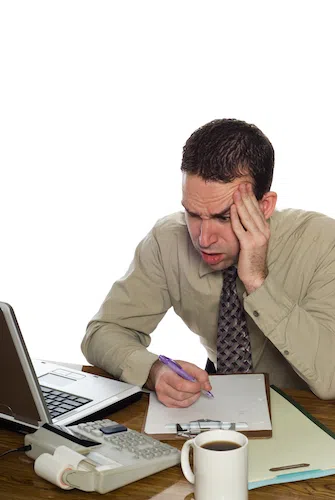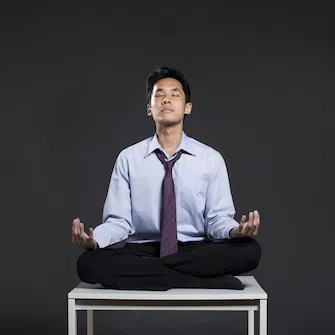Robbing your body of sleep jeopardizes health and business.
Nearly 50 million Americans suffer from sleep disorders that affect their work, relationships and safety, according to a Sleep in America poll released last month by the National Sleep Foundation (NSF).
"The effects of sleep loss on work performance are costing U.S. employers tens of billions of dollars a year in lost productivity," says Darrel Drobnich, NSF acting CEO. "It's time for American workers and employers to make sleep a priority."
As business owners, we are certain you have had your share of sleepless nights worrying about company finances, employees and the future of your business. And during busy heating and cooling seasons, it is a safe bet that you have burned the midnight oil more often than you should.
While missing a good night's sleep every once in a while won't harm your health, consistently depriving your body of much needed rest will.
The quality and quantity of your sleep determines how effective you will be the following day. Recharging your system prepares you mentally and physically. Without a proper recharge you may be putting your business and yourself at risk.
According to the Sleep in America poll, 36 percent of respondents have nodded off or fallen asleep while driving and 26 percent say they drive drowsy during the workday. In an industry where driving is a must, these statistics are alarming.
Sleep is a very active time for the brain, and just like a furnace or air conditioner, the body goes through several sequences before it enters a deep, rejuvenating sleep. The entire sleep cycle takes about 90 minutes and we go through multiple cycles throughout the night. If these cycles are interrupted, the body can't enter into truly sound sleep.
There are myriad reasons why people don't get a restful night's sleep. The responsibilities of being a business owner are reason enough to fall into irregular sleep patterns or even insomnia. However, insomnia can seriously impact quality of life, daily activities and safety. It also can lead to depression, illness, heart disease, a weakened immune system and poor glucose metabolism, which can lead to diabetes and obesity.
Sleep requirements vary, but most adults should get at least seven to eight hours of sleep per night. Additionally, it should not take more the 30 minutes for you to fall asleep.
We know we should get a good night's sleep, but the reality is that our fast-paced lifestyles don't often permit that luxury. Oftentimes we just accept less sleep and cope with the effects. The problem is that how we cope with drowsiness (caffeine and sugar) leads to more sleep issues. Additionally, quick-fix tactics to fall asleep (alcohol) can have adverse effects.
Caffeine and nicotine, certain medications, chronic pain and disruption of life due to travel or non-traditional work shifts can all cause insomnia. And you probably guessed that stress also is a major contributor, therefore anything you can do to manage daily stress will help you sleep better.
In a perfect world, you should try to sleep when it is dark and stay awake when it is light. Your sleep and wake times should be about the same every night, including weekends. It is important to attempt to train yourself to fall asleep without any outside stimulants. If you can't fall asleep within 30 minutes, get out of bed and try again later when you're tired.
Additionally, a daily exercise routine will help you sleep better, but avoid exercise three hours before going to bed. It is also prudent to avoid nicotine, caffeine and alcohol prior to sleep and avoid spicy meals and large meals with lots of beverages, which may cause you to wake during the night to urinate.
In a contractor's world, you do the best you can. If you have to sleep during the day, investing in a sleep mask or curtains that block out all outside light will help your body move into sleep mode. Ear plugs will help cut down on daytime noises that prevent a restful sleep.
And if stress won't subside the minute your head hits the pillow, invest in a small tape recorder to place on your nightstand. For many, the minutes before sleep are the only moments you have without distraction. Unfortunately, working through issues and replaying scenarios will elevate your stress level. Use the tape recorder to record thoughts and solutions. By putting your thoughts to "bed" you might just be able to sleep as well.
If behavioral approaches don't work, chronic insomnia may require medical treatment prescribed by a physician.
We advise caution when using over-the-counter and prescription medications for sleep. Always start with the lowest dose possible and only use these products for short durations. Over-the-counter medications for sleep include Benadryl, Melatonin and Valerian. Do note that these medications have not been extensively studied for sleep nor are they approved by the Food and Drug Administration because they are considered over the counter. Prescription medications are a last resort. While they are very effective, they are used as a short-term solution while working on the underlying causes of sleep disruption.
Overall, sleep is vital to normal daily functioning. We need an appropriate amount of quality sleep for the proper functioning of our entire body. In fact, without sleep we could not survive. To optimize your business, a well rested and mentally sharp team is paramount. Do not underestimate the importance of a good night's sleep.



